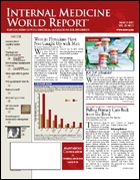Experts%u2019 Call for Universal HBV Vaccination of Young Adults Not Likely to Pass
Experts’ Call for Universal HBV Vaccination of Young Adults Not Likely to Pass
Costs Will Likely Keep the Focus on High-Risk Groups
By Andrew Bowser
ATLANTA—New national hepatitis B virus (HBV) vaccination guidelines now being drafted—the first major update of HBV recommendations in >10 years— would likely emphasize immunization of high-risk adults but would stop short of an age-based recommendation that some experts favor. The draft was discussed at the recent Advisory Committee on Immunization Practices (ACIP) meeting.
Most members of the guidelines workgroup did not support routine hepatitis B vaccination for young adults aged 19 to 25 years old.
“Our concerns were that this approach would not have a major impact and could divert resources from more fruitful strategies,” said workgroup member Tracey Lieu, MD, of Harvard Medical School, Boston.
Instead, the group is proposing a strengthening of policies that promote vaccination of adults in risk groups, such as patients on dialysis, injection-drug users, and occupationally exposed workers.
A “small but passionate minority” of workgroup members did support the idea of a universal vaccination of persons aged 19 to 25 years, Dr Lieu noted, adding that the group had considered recommending routine vaccination “where feasible,” but the language “didn’t satisfy the majority or minority” of the group and so was left out of the draft.
In a letter addressed to ACIP chairman Myron Levin, MD, the noted hepatitis expert Eugene R. Schiff, MD, chief, Division of Hepatology,University of Miami School of Medicine, urged the committee to discard the risk-based stratification strategy in favor of an “age-based universal recommendation” for hepatitis B immunization of adults.
“Not only are most routine vaccines no longer recommended by risk criteria, but up to one half of patients who acquire hepatitis A or B would not have received vaccination under these recommendations,” Dr Schiff wrote. Broader recommendations would provide a “great opportunity to reduce the burden of this disease,” he pleaded.
Eric Mast, MD, MPH, of the National Center for Infectious Diseases, pointed out that there is no evidence that a universal strategy would be feasible, “because there is simply no platform now for adult vaccination for which you could achieve high coverage,” he said.
Furthermore, rough estimates suggest a cost of $83,000 per prevented infection for a universal adult recommendation compared with $550 per prevented infection for vaccinating only those in high-risk settings, such as persons visiting sexually transmitted disease clinics or participants of substance abuse prevention programs. Vaccinating adult target groups would reach “more than 85% of persons getting hepatitis B,” Dr Mast said.
In 2003, an estimated 73,000 persons were infected with HBV, according to Dr Mast. Nearly all these infections were in persons aged ³25 years.
As of this ACIP meeting, the recommendations were still out for public comment. A final vote on the draft is expected at the next meeting, which is expected to take place in June.
